- Home
- Anthony Ryan
The Wolf's Call Page 2
The Wolf's Call Read online
Page 2
He is the Mestra-Dirhmar, I reminded myself, repeating the words and lowering my gaze in concert with the thousands of others gathered to witness this most sacred of rituals. He speaks for the Unseen. Even then the words felt empty, my subservience merely the rote response of a well-trained dog. A smaller but truer thought lay beneath my obeisance, even as I and the gathered luminaries of a hundred Skeld sank to our knees and bowed our heads to the earth: He is just a weak old man. Tehlvar was better.
You should understand, honoured reader, that I did not love Tehlvar. At thirteen years his junior I barely knew him except by reputation, but what a reputation it was. They say he killed more than fifty men in combat before ascending to Skeltir. It was under Tehlvar’s leadership that the pre-eminence of the Cova Skeld had been completed. It was through his courage and skill at the battle of the Three Rivers that the heretic traitors to the Divine Blood had been slain or captured. Although a good deal of discord lingered, many Skeld of the Hast now stood as allies rather than endlessly feuding rivals. But it hadn’t been enough to spare Tehlvar the Great Priest’s knife.
Having been called to the Great Tor, he was required to answer the last of the Three Questions, an answer that would see him receive his final blessing as Mestra-Skeltir: Great Lord of the Hast. Twice before the priests had summoned him to answer a question, and twice before he had provided an acceptable answer. Not all Skeltir are chosen for this honour, just those who have won the greatest renown. Years would pass without a question being asked and only four other Skeltir in all the long history of the Hast had ever answered two questions correctly, and none the third. Long had we awaited the coming of the Mestra-Skeltir, the leader who would ensure our ascendancy over not just the Iron Steppe but the far-wealthier lands of the Merchant Kings to the south.
But whatever Tehlvar’s answer had been, spoken only to the gathering of priests far beyond the ears of the assembled throng, it had not been sufficient to secure his ascendency. Druhr-Tivarik he was, the Divine Blood flowed in his veins as it flows through mine, but it had been proven weak, and if the blood be weak, let it spill.
“Kehlbrand Reyerik!” the Mestra-Dirhmar intoned, lowering the knife to point the blade at the young man kneeling at my side. “Stand and be recognised!”
I watched my brother rise, seized by the impulse to reach out and stop him somehow. Although young and steeped in the priests’ lies as I was, I still knew his choosing to be a curse and not a blessing. To restrain him at that moment would have meant death, and not the swift end meted out to Tehlvar. Interference in the priests’ rituals would earn me the worst of torments. So perhaps it was fear that stilled my hand then, for I have never pretended to be the bravest of souls. But I don’t think so. I think that, like all the many others present, I wanted it to be Kehlbrand. I wanted to witness the moment the true Mestra-Skeltir took his place. So I didn’t try to stop him, not then. That came later.
“By right of blood you are now Skeltir of the Cova Skeld,” the priest told Kehlbrand. “As dictated by the Laws Eternal, tomorrow morning will be set aside for challenges. Any warrior of sufficient rank who defeats you will stand as Skeltir in your place.”
Kehlbrand bowed his head in grave acceptance before raising it to meet the priest’s gaze with an expectant eye. I saw the old man’s face flush with angry reluctance then. He could simply stay silent; having formally appointed my brother to the role of Skeltir, he had no obligation to also call him to the question, save for the fact that Kehlbrand had already achieved far-greater renown than most others who had received such an honour, as every member of the Hast well knew.
The priest’s lips slipped over his yellowed teeth in a poorly concealed half sneer before his features resumed the mask of dutiful certainty. “If you live,” he said, “return here one hour before the sun’s apex to answer the First Question of the Unseen.”
He let his arm fall to his side and paused to survey Tehlvar’s body. I found his expression a sudden contrast to the mask from only seconds before. Now he seemed much older, sadness and regret clear in his eyes for one brief instant before he turned and walked away amidst the ranks of the lesser priests.
My people are never fond of overlong rituals, and soon the representatives of the hundred Skeld had all drifted away to their respective encampments. Kehlbrand, however, lingered and therefore so did I. Moving to the altar, he closed his eyes and placed a hand on our brother’s forehead, murmuring his own soft farewell. He had been at Tehlvar’s side for much of the preceding few years, gaining enough renown to justify a challenge for the Skeltir’s mantle, but he never had.
A loud belch sounded behind me, and I glanced over my shoulder to see Obvar leaning against a monolith, wineskin in hand as he regarded me with a questioning glance.
“He’s saying goodbye,” I said, turning away.
“The pious arsehole’s dead,” Obvar muttered, coming to my side. “Can’t hear it, so what’s the point?” The question was evidently rhetorical, for he forestalled my curt response by proffering the wineskin. “Drink?”
Obvar was always offering me drink, and more besides. It was many years since his childhood bullying had given way to a different kind of interest. I often reflected that I preferred him as a bully rather than a suitor. However, my initial impulse to stern refusal stalled on my tongue as I noted the absence of carnal interest in his gaze. Unlike Kehlbrand, the disparity in our height had grown over the years, and I was obliged to look up to gauge his expression. For once he seemed troubled rather than lustful.
“Give it here,” I said, taking the wineskin. The first sip had me blinking in surprise. Instead of the thick, floral berry wine typically drunk by the Hast, this was something far lighter on the palate. The taste was rich and complex, shot through with a pleasing earthiness and balanced by a smoothness that made it slip down the throat very easily.
“That’s not cheap, you know,” Obvar said, his thick brows bunching as I took another generous swallow.
“What is it?” I asked, handing back the wineskin.
“Not sure of the name. It’s made from some kind of fruit grown in a land far across the sea. At least that’s what the merchant I stole it from said. I let him live on the condition he come back next summer with more. Said I’d even pay him for it. Wasn’t that nice of me?”
“Did you let the others in his caravan live?”
“The young ones.” He shrugged and drank. “Slaves are valuable.”
“What a disgusting animal you are, Obvar.” The heat of genuine detestation sang in my voice, loud enough to make the wineskin pause on the way back to his lips, which broadened into a smile.
“Eighteen summers old,” he said, looming over me as he stepped closer, the familiar lust creeping back into his gaze. “And still not wed. I always like the way your tongue cuts me, girl. Makes me wonder what else it can do.”
I stared directly into his eyes, meeting the lust I saw there with utter disdain. I wasn’t afraid and felt no need to reach for the long-knife on my belt. I was Druhr-Tivarik and, whilst childhood torments would have been punished with a beating, any insult or injury now that I was of childbearing age would earn him the lengthy death of a dishonoured warrior. However, as our gazes locked and seconds stretched into moments, I was given to wondering if this was the day when his lust finally overcame his caution.
“When your brother becomes Mestra-Skeltir,” he said, voice thick and teeth bared, “we will conquer all. We will ravage the lands of the Merchant Kings all the way to the Golden Sea, and I will be at his side for every battle. When all the glorious slaughter ends and the final drop of blood falls, he will ask me what reward I desire for my service. What do you imagine I will ask for?”
“Luralyn.”
Our eyes snapped to the altar at the sound of my brother’s voice. Kehlbrand didn’t look at us, standing with arms braced against the altar’s edge, his gaze still captured by Tehlvar�
�s body. “I will have counsel,” he said before glancing up at Obvar. “Saddle brother, go and slake your appetite on a slave and leave my sister be. And don’t get too drunk. I may have need of your blade on the morrow.”
Obvar stiffened and I saw a faint twitch of resentment pass across his lean, bearded features. It faded quickly, however, and he let out a faint sigh of acceptance. Saddle brothers they were, but Kehlbrand was Skeltir now.
“Here,” Obvar grunted, shoving the wineskin into my hands. “A token of esteem for my Skeltir’s sister.”
I watched him stomp off towards the encampment of our Skeld, feeling a brief spasm of sympathy for whichever unfortunate slave caught his interest. Slaves are not of the Hast. I inwardly recited one of the Laws Eternal as I joined Kehlbrand at the altar. Anything not of the Hast is booty.
“Have some,” I said, holding out the wineskin. “It’s really not too bad.”
He ignored the offer, gaze lingering on our brother’s slack, empty features. The lips had drawn back in death, baring his teeth in a parody of a grin. Unwilling to endure the sight of that grin for long, I occupied myself with another generous gulp of Obvar’s wine.
“Do you know why the priests killed him, Luralyn?” Kehlbrand asked. As usual, his voice was soft. My brother rarely shouted. Even during the duels I had seen him fight, the few words he spoke amidst the tumult of blades were spoken in a steady, almost solicitous murmur. Nevertheless, I can recall no one ever failing to hear or comprehend a single word he said.
“He got the question wrong,” I replied, wiping the sleeve of my formal black cotton robe across my mouth.
“I hear no grief in your voice, little colt,” Kehlbrand said, finally turning to regard me. “Did you not love our brother? Does your heart not break at his departure from this world?”
To anyone listening, his questions would have been taken as earnest, sincere inquiries, coloured by an aggrieved note at my apparent indifference. I, however, knew my brother well enough to recognise gentle mockery when I heard it.
“We were birthed from the same womb,” I said. “But not the same father. Tehlvar was a stranger to me for most of my life. But . . .” I paused to survey the corpse on the altar, struck once again by the sheer number of battle wounds it bore, some long healed, others barely weeks old. Kehlbrand’s body, I knew, was almost entirely free of scars. “Still, I’m sorry he’s gone. He was a good Skeltir, if a little overfond of reciting the priests’ teachings.”
“The priests’ teachings,” Kehlbrand repeated with a slow nod. “He did always love their lessons. ‘I have ranged beyond the Iron Steppe, brother,’ he told me once. ‘The people who dwell there live lives of uncertainty and confusion. They celebrate weakness and revel in greed. They make a virtue of lies and a sin of honesty. When the Mestra-Skeltir rises, he will wash all of that away, in blood. This the priests have seen.’”
He fell silent, reaching out to place his hand over the dull gleam of Tehlvar’s eyes, closing the lids. “But you’re wrong, little colt. They didn’t kill him for the answer he gave. They killed him because he gave no answer. He was not the Mestra-Skeltir, and he knew it.”
“He made way for you,” I said.
“Yes. He told me as much last night. We spoke for a long time and he told me many things, including the question I will be asked tomorrow, and the question to follow a year later should I answer correctly.”
I stared at him in appalled silence, the wineskin almost slipping from my fingers in shock before I mastered myself. I found it necessary to take another drink before speaking on. “He told you? That is heresy!”
Kehlbrand’s teeth, very white, very even, shone as he let out a rare laugh. “In time, dear sister, I will tell you all I learned last night, and you will come to realise the true absurdity of the words you just voiced.”
His mirth subsided quickly and he lifted his hand from Tehlvar’s eyes to grasp my shoulder. “Tomorrow, they will ask for my name.”
“They already know your name. Kehlbrand Reyerik, Skeltir of the Cova Skeld.”
“No, they require another name. A name worthy of the Mestra-Skeltir. A name the soldiers of the Merchant Kings will whisper in fear when they hear the thunder of Stahlhast hooves upon the Steppe. A name that will carry us all the way to the Golden Sea, and beyond.”
His hand moved from my shoulder to my face, cupping my cheek. I saw regret in his face as he smiled at me, guilt too, for he knew the gravity of what he was about to ask. “That is what I need from you: a name. Luralyn, dear sister, it is time for you to dream again.”
Although I tried to resist it, although it was something I had avoided doing ever since coming to this place, my eyes were drawn inevitably to the Sepulchre. It sat in the centre of the half-circle of iron and rock that formed the Great Tor. An unadorned, grey stone box ten paces wide and twelve feet tall with an opening in its east-facing wall. The opening was a black rectangle in the grey stone, for no light came from within. The priests never guarded it. Why bother since no soul would ever venture inside unless commanded to it?
“Do not fear,” Kehlbrand said as my eyes lingered unblinking on the Sepulchre’s black door. “The priests know nothing. We’ve made sure of that.”
“They will,” I said, finding it impossible to quell the tremor in my voice. Unbidden, my hand had stolen into my robe to close on the inscribed tiger’s tooth, clutching it tight. “Even with this, so close . . . to that. They’ll know.”
“You overestimate their abilities. They possess barely a fraction of the power they pretend. Their true power lies in the illusions they spin to capture the souls of our people, and all illusions fade over time. Another lesson Tehlvar imparted last night.”
“They’ll know!” I insisted, hating the sudden tears in my eyes. His request felt like a betrayal, a selfish demand that undid the trust between us. For alone amongst our Skeld, alone amongst all my many siblings and cousins in the Divine Blood, only he knew the truth. Should the priests ever discover it, through the black door I would go, and what emerged would not be me.
“They’ll make me . . .”
My voice failed as he drew me close, his arms enfolding me like twin branches of the mightiest tree. There were other words to come, other pledges and promises, but I have since comprehended that our bond was sealed in this embrace. It was this moment that I became truly his. In his arms all fear fled and I knew he would never allow any harm to be done to me, in body or in soul.
“I will kill every priest should they even suggest it,” he told me, voice soft in my ear. “I will paint this tor with their blood and stake their heads in a circle around the Sepulchre for all the Hast to see.” He drew back, thumbing away my tears as he had done so all those years ago, except this time there would be no slap to follow the kindness. “Do you believe me, little colt?”
“Yes, brother,” I said, pressing my head to his chest, hearing the steady thrum of his heart. “I believe you.”
* * *
◆ ◆ ◆
Summoning a True Dream is not a complicated process. Nor is it mystical or ritualistic. Contrary to the beliefs of more unenlightened cultures it requires no incantations, foul-smelling concoctions or blood spilled from unfortunate animals. In truth, as I had discovered in the years since the first manifestation of my gift, it requires only a secure and comfortable place rich in both peace and quiet. Consequently, I forsook the Cova encampment that night. The revels had begun early, customary propriety cast aside in the usual welter of drink, brain-addling snuff and undiscerning copulation.
Escorted by Kehlbrand and two of his most trusted saddle brothers, we left the din of the celebration behind and rode beyond the sprawl of tents and out into the vastness of the Iron Steppe. A five-mile ride under the stars brought us to a small rise in the otherwise unbroken flatness of the landscape. The two warriors pitched a tent atop the rise, attached the reins of their horses to
their wrists with long ropes and retreated to a respectful distance. One faced east, the other west. Both had their strongbows unlimbered with an arrow nocked. I knew not if Kehlbrand had told them what would occur this night, but also knew if he had, they would also never speak of it. Loyalty was absolute amongst those who secured his friendship.
“In case you get bored,” I said, handing Obvar’s wineskin to Kehlbrand.
“Ah,” he said after a small sip, eyebrows raised in appreciation. “I know this. Made from a fruit called a grape by barbarians across the Wide Sea. They reside in a kingdom beset by endless wars and irrational superstitions.” He set the wineskin down next to the small fire he had lit. “They’ll be glad of the peace we bring them in time.”
“You intend to ride so far?”
“I intend to ride all the way around the world. For have not the priests foretold this as the course of the Mestra-Skeltir?”
I rolled my eyes at him and crawled into the tent. “Don’t finish it all.”
I divested myself of my oxen leather garb and lay on the furs his saddle brothers had set down for me. As ever the wind was stiff on the Steppe and the tent walls snapped continually. It was a familiar refrain and failed to disturb me as I sought the peaceful mind-state that would bring on the black veil and the True Dream.
After my first experience I had shunned my gift for a long time, fearful of what I might find once the veil parted. But curiosity, perhaps the hardest of all habits to break, eventually compelled me to seek it out. My attempts had been faltering at first; the True Dream brought brief glimpses of places and people so alien in dress and speech that whatever message I had been sent became meaningless. It was only after much experimentation that I discovered that the True Dream requires a purpose, a question to guide it towards truth.

 Raven’s Shadow Book One: Blood Song (Raven's Shadow)
Raven’s Shadow Book One: Blood Song (Raven's Shadow)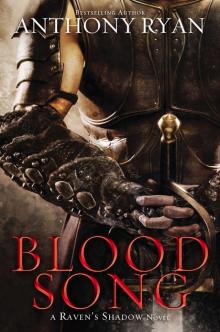 Blood Song
Blood Song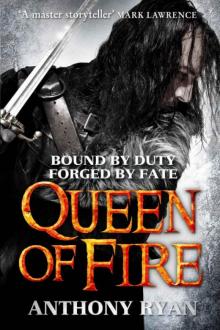 Queen of Fire
Queen of Fire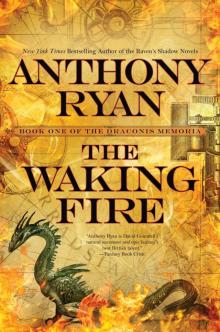 The Waking Fire
The Waking Fire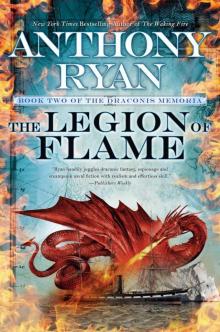 The Legion of Flame
The Legion of Flame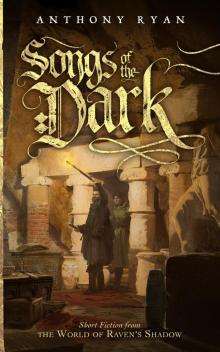 Songs of the Dark
Songs of the Dark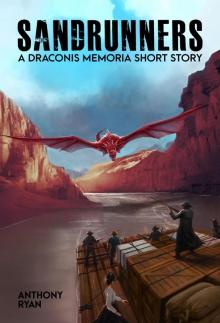 Sandrunners--A Draconis Memoria Short Story
Sandrunners--A Draconis Memoria Short Story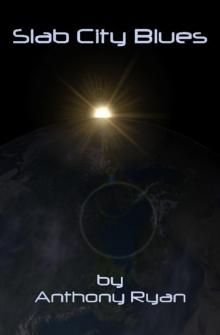 Slab City Blues
Slab City Blues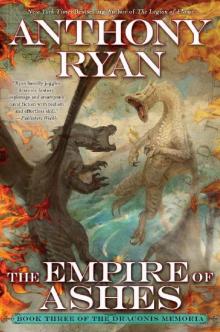 The Empire of Ashes
The Empire of Ashes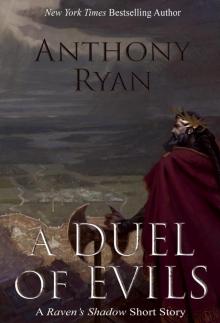 A Duel of Evils
A Duel of Evils The Pariah
The Pariah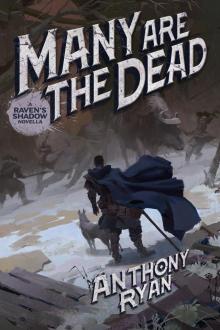 Many Are the Dead
Many Are the Dead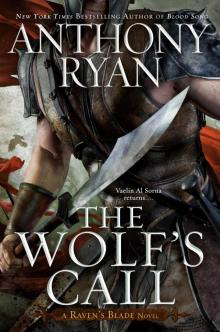 The Wolf's Call
The Wolf's Call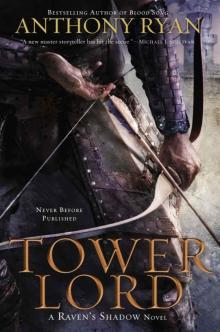 Tower Lord (A Raven's Shadow Novel)
Tower Lord (A Raven's Shadow Novel)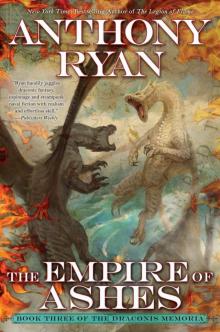 The Empire of Ashes (The Draconis Memoria)
The Empire of Ashes (The Draconis Memoria)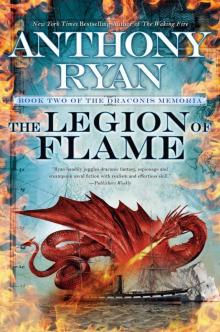 The Legion of Flame (The Draconis Memoria)
The Legion of Flame (The Draconis Memoria)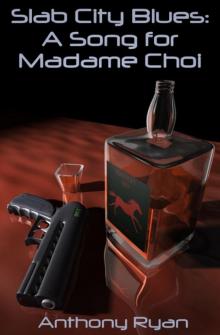 Slab City Blues: A Song for Madame Choi
Slab City Blues: A Song for Madame Choi